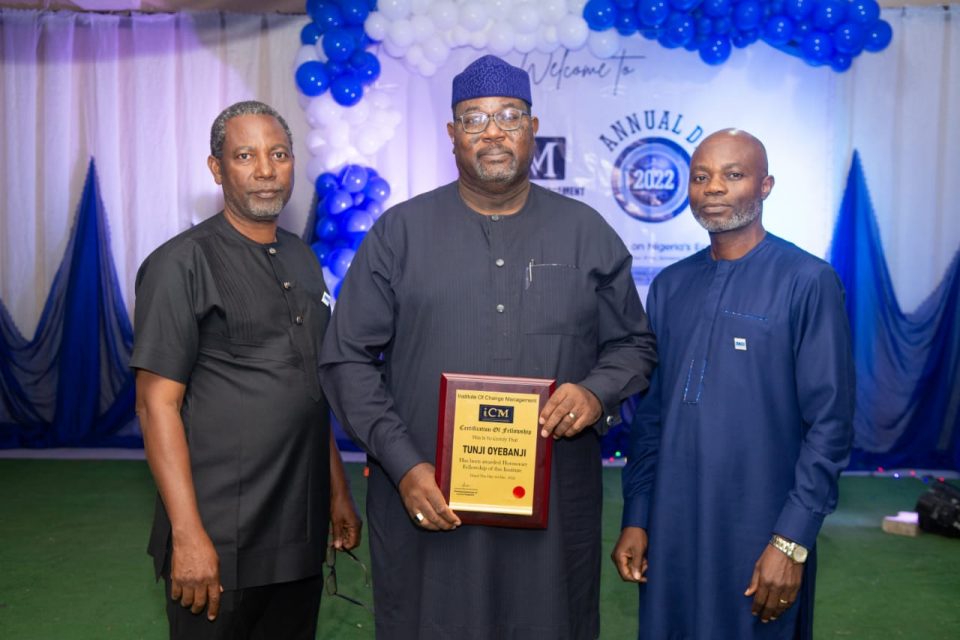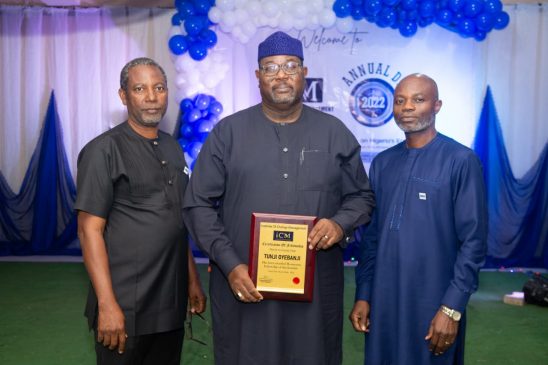Subsidy preventing investments in Nigeria- Oyebanji
L-R; President, Institute of Change Management(ICM), Mr.Beifoh Osewele, Guest speaker/Managing Director, 11 Plc, Formerly Mobil Oil Nigeria Plc, Mr.Adetunji Oyebanji and Registrar,ICM, Mr.Joseph Anetor at the 2022 annual dinner of ICM where Oyebanji was conferred with the honorary Fellow of ICM held in Lagos at the weekend.
By Yunus Yusuf
Mr Tunji Oyebanji, the Managing Director, 11 Plc, says that the huge amount spent on subsidy in Nigeria is preventing investment in critical area of the economy, and increasing rate of unemployment.
Oyebanji said that by extension, young promising Nigerians are affected the more.
He said this at the yearly dinner of the Institute of Change Management (ICM), tagged “Impact of insecurity and oil subsidy on Nigeria’s economy”, in Lagos on Sunday.
The managing director said that subsidy payment was one of the major factors fuelling the high level of unemployment rate in the country.
He noted that the situation had resulted into crimes perpetrated by the youth.
According to him, the funds expended in subsidy payment could have been channelled into productive sectors that would generate employment opportunities for the nation’s teeming unemployed youths.
“Government spent N4 trillion on subsidy in 2022, N1. 573 trillion in 2021, N440 billion in 2020, N350 billion in 2019 and N722.3 billion in 2018 respectively.
He said that the 2022 budget stood at N17.126 trillion of which subsidy payment stood at N4 trillion.
Oyebanji said that the amount government paid on subsidy was 36 times more than what was allocated to education, 33 times more than allocation to transportation, 34 times of healthcare 26 times of Defence sector.
He said that high subsidy payment had increased borrowing, socio-economic collapse, constrained budget and declining external reserves
On the current fuel scarcity, Oyebanji said operators in the oil and gas industry had always advocated a complete deregulation of the industry to create a level playing field for many suppliers of petroleum products into the country.
He said that any market where there is a single supplier of a commodity, there is bound to be scarcity.
“Full deregulation of the downstream sector is inevitable. The money that would have been used to grow the economy is being channeled to subsidy.
“Apart from feeing up money which would be used for other socio-economic projects and rebuilding infrastructure which would benefit all Nigerians.
“Deregulation would boost local and international investment in the industry, ultimately creating job opportunities for millions of Nigerians.
“Today, there is only one supplier in the industry which is Nigerian National Petroleum Company Limited (NNPC). This is not an ideal situation.
“Any market where there is a single supplier, most likely we will find hiccups along the line.
“So, the fundamental solution or the basic solution to the problem is to free up the market and allow people to be involved in the potential distribution of the product.
He, however, stated that all hands must be on deck to normalise the situation which he hoped would be addressed in no distant time.
“The quantity of petroleum available is one thing while the other thing is where is the fuel.
“If you have a lot of petroleum products , but it is on the high side and not in the tanks or depots and in the tanks in the petrol stations, then you will have a problem.
“So, I think the issue is not so much the quantity of product that may be available offshore what is rarely available in everybody’s tank and in the petrol station.
“So, where we are all working hard now is to work on the logistics to make it easier and quicker for products to get into our tanks or the depots, and by extension delivered to the petrol stations, so, sometimes when you hear about the figures or the stock that is available, it may be stock that is available for maybe on the high seas,” he added.
“So everybody is now working hard to make sure that that is on the high seas, is translated to put out in the tanks and distributed to the service stations.
“But of course, once there is a scarcity situation, it takes double the effort to stop those queues because you have to distribute at a faster rates at a higher level to make sure they disappear, but I am sure with the efforts going on with the NNPC, MOMAN and everybody working together, the queues will soon be a thing of the past,” he added.
Responding to a question about stakeholders’ thoughts on deregulation, he said: “The issue of deregulation is the big elephant in the room. We have consistently advocated that we need to be fully deregulated.
“Government in its wisdom decided to postpone that for some months, but I think it is inevitable that we get to where we are currently.
“We have no choice because today we are bleeding. The subsidy money is taking away money that we should have been using for investments in growing the economy and creating jobs for people.
“So, it is inevitable that we get here. Our borrowing is also going through the roof.
“So, if we do not stop or completely disengage from this subsidy payments I am afraid it will hamper the growth and development of Nigeria’s economy into the future.
“So, we really need to deal with it decisively once and for all,” he said.





